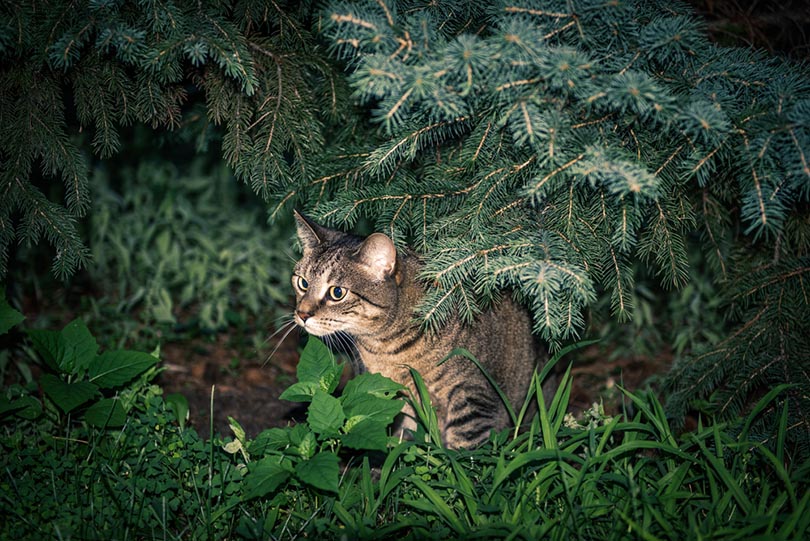How to Keep Cats Away From Chickens: Vet-Approved Tips & Tricks
By Dr. Luqman Javed, DVM (Vet)
Updated on

Chickens were widely perceived to be solely farm pets; however, in recent years, the trend of keeping chickens as pets has risen in popularity. Part of their appeal is that many pet owners are able to set up self-sustaining chicken farms in their backyard or garden, allowing them to enjoy the companionship of a pet while also enjoying a low upkeep cost for their flock.
A common problem most chicken pet owners face is predator control. Unfortunately, many predators will readily hunt chickens, and some even go after their eggs and feed. Though cats rarely attack fully grown adult chickens, they can opportunistically hunt chicks or juveniles if the opportunity ever arises.
If you’re worried about a cat threatening your flock, read on as we discuss tips on how to keep your flock safe from an encroaching cat.
Do Cats Hunt Chickens?
Regardless of if a cat is a pet or feral, they have the potential to attack chickens. At times, some cats will attack them with the intention of making a kill. More often than not, these cats are feral and are more likely to attack the younger chicks that have wandered a little too far from the rest of the flock. Cats will rarely attack the larger, healthier adults. Plus, if a member of the flock sounds the alarm, it’s possible that the cat will move on to easier prey that they can ambush.
Juveniles and chicks are most at risk of getting attacked by a cat. Because they’re so small, they’re an easier meal and more manageable for a cat. A cat could either successfully subdue the chicken or injure them before they’re scared or chased off. For the chickens that are injured, you must call a veterinarian since their wounds could quickly become infected and then cause further complications.

While your pet felines are less likely to attack chickens than feral cats with the intention of killing them, they could still potentially hurt members of the flock while playing with them. Cat claws are extremely sharp; however, most pets will eventually learn to leave them alone. Some owners of cats and chickens have even reported that their cats prefer to cuddle with their chickens and that members of the flock have been able to distinguish which cats are friendly household pets and which ones are dangerous. However, this is all anecdotal.
Pet owners usually view this as a positive trait since the cats could potentially provide protection to their flock by protecting their territory from other free-roaming cats in the area. However, you can’t ethically expect your cat to safeguard your flock since a scuffle with another cat could result in injuries for them as well. Keep in mind that cats also have their own predators that they have to be on guard for.

Keep in mind that broody hens might change their behavior toward a cat they were once friendly with, especially if they venture too close to their chicks. The hen could attack or peck at the cat, even if their intention isn’t to harm them. If this happens, it’s best to keep your cat separated from the chicks so as not to cause unnecessary stress to any of the animals.
Tips for Keeping Cats Away From Chickens
It is always a better idea to err on the side of caution when it comes to protecting your flock from cats and other potential predators. Even though you likely have fences to protect them from predators, a fence won’t necessarily keep a cat out. Felines are highly athletic and would have no issues scaling a tall fence or balancing on narrow beams to get to their intended target.

On top of that, pet owners often overlook their cat’s ability to squeeze through narrow openings. Even a small gap under your fence could be big enough for a cat to squeeze through. Just because you think it’s too small doesn’t necessarily mean it is.
With all of these factors in mind, understand that the best way to protect your flock from a cat is with a secure coop with a covered run. This allows your chickens to forage outdoors without the risk of being attacked by whatever predators are nearby.
Coops come in all shapes and sizes, and many manufacturers allow you to pick the specific dimensions to fit your yard and flock perfectly. This is especially important for the younger chicks since it provides protection not only from predators but from the weather as well.

While some people swear by it, using other animals to protect your flock, such as livestock dogs, geese, donkeys, etc., is controversial. It could prove beneficial in some cases, but the presence of other animals alone won’t guarantee their protection.
Keep in mind that these other animals will also come with additional costs to you. For example, veterinary care for certain farm species is likely going to be more expensive than that of companion animals.
Conclusion
Raising chickens is a rewarding experience many have taken a liking to. As with all pets, it’s up to you to ensure their safety. It means proper care and protection from predators, including cats. Fortunately, you have several options for keeping them safe. You may find implementing more than one will work best. Above all, a secure coop should be considered mandatory to ensure that cats and other predators don’t gain access to your flock.
Featured Image Credit: Paul W Thompson, Shutterstock













